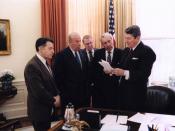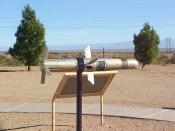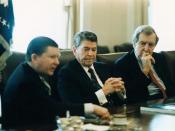Iran-Contra Affair The Iran-Contra affair during the 1980's was a U.S. scandal that involved the secret sale of fire arms to Iran and the use of some of the proceed to support a right-wing Nicaraguan guerrilla movement at a time when such aid had been band by congress. The administration of President Ronald Reagan confirmed two major foreign policy dilemmas in the mid-1980's, each with serious domestic policy implications.
The first foreign policy dilemma concerned the fate of about a half-dozen Americans who were being held hostage by Islamic guerrillas in Lebanon. The guerrillas were known to have close ties to the Islamic government of Iran, with which the U.S. had been at odds since the late 1970's. Iran was desperate to buy weapons for its ongoing war with Iraq. At the same time, the government of Israel, pursuing its own security interest, did not want to see the government of the Iraq revolutionary leader Saddam Hussain score a quick victory over the Iranians.
Beginning in 1985, acting on information from Iranian and Israeli emissaries, some U.S. officials came to believe that in exchange for sale of U.S. weapons to Iran, the Tehran government, which is the capital of Iran, would use its influence to gain freedom of the U.S. hostages that where held in Lebanon by pro-Iranian terrorist. This firearms for exchanged of hostages plan had four important drawbacks. First, it contradicted President Reagan's publicly stated his determination not to make any deals with terrorists. Second, it disobeyed U.S. official policy of not selling firearms to Iran. Third, it required absolute secrecy, since if the plan ever went into the public through congress leaks, the publicity would be extremely embarrassing. Fourth, there was no guarantee that the sale of firearms to Iran would actually bring an end to the...


